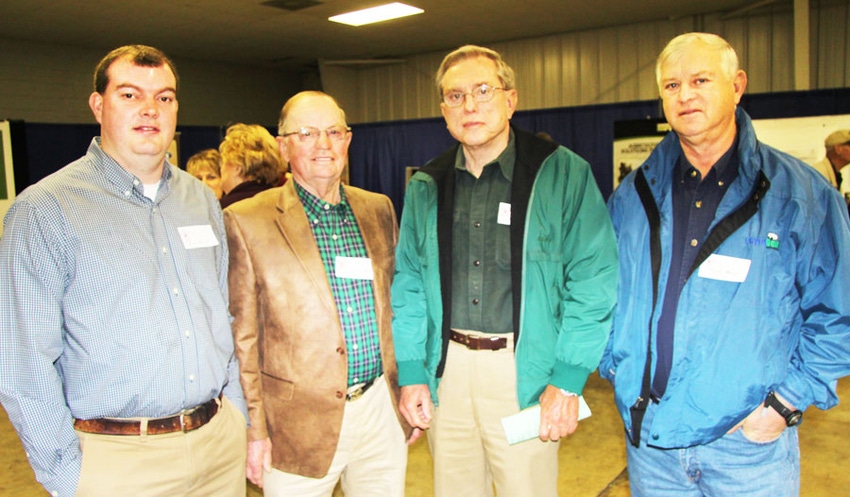
Following a tradition that began more than 50 years ago with a group of producers and Mississippi State University Extension and research specialists meeting under a shade tree at the Holly Springs Experiment Station, several hundred farmers from 27 counties now gather annually to discuss what they see as needs for crop and livestock enterprises.
“I’ve been attending this Northeast Mississippi Producer Advisory Council meeting for 29 years of my career,” said Bill Herndon, associate vice president of the MSU Department of Agriculture, Forestry and Veterinary Medicine. “It has a long, rich tradition of listening to those we serve.
‘The conscientious feedback we get from producers helps us in our program development efforts, both in Extension and research. We do attempt to respond to these recommendations through the university, Extension, and experiment station system.”
That producers “are willing to take their own time to come together and help us in devising programs to help a greater number of people, says much for the quality of those in our state’s agriculture,” said George Hopper, director/dean of Mississippi Agriculture and Forestry Experiment Station and College of Agriculture and Life Sciences.
“This direct input is critically important to our faculty and staff, and I can assure you that we listen to these suggestions and take them very seriously.”
Producer assistance is also important, Hopper says, in providing feedback to “our political leaders – in our state legislature and in Congress – as they make difficult decisions about our budgets and allocation of resources. We encourage you to express to these key leaders the importance of helping us with appropriations.”
He noted that Keith Morton, Falkner producer, recently represented producers in an appearance before the Mississippi legislature to discuss the importance of MSU agriculture and forestry programs. “This is the kind of help we need in making our legislators and decisionmakers aware of the key role that agriculture and forestry play in our state’s economy.”
In the past year, Hopper says, several leadership positions have been filled in the university/Extension/research system, along with several relocations and changes in responsibility.
“We recently hired a new department head for animal and dairy science, a new head of poultry science, and a new head of food science, nutrition, and health promotion. In the last two years, we’ve filled 10 of 14 new department head positions and searches are in progress for others, including one for the Delta Research and Extension Center and one for Wildlife, Fisheries, and Aquaculture.”
Hopper asked producers to “help us in our goal of producing future leaders by encouraging your sons, daughters, grandchildren, and others to consider careers in agriculture, natural resources, forestry, and related sectors.
“We need these young, bright minds to come into agriculture and help us solve our future needs and problems in food production, environmental protection, and social issues related to the world’s food and fiber needs.”
Among recommendations made for livestock and specialty sectors from the various chairmen were:
Turf, David Rainey, Alcorn County — Continue research on control of Virginia buttonweed, “one of our biggest problems”; continue research on tensile strength for sod; provide research on poultry litter as fertilizer; and fill the Extension turf specialist position upon the coming retirement of Wayne Wells.
Swine, Byron Wilson, Chickasaw County — Reactive the nutrient management task force, an interdisciplinary group to provide guidance to producers on environmental issues; conduct research on control of feral hogs.
Ornamentals, Tim Burress, Union County — Provide research on composting of hardwoods and lawn/garden materials; develop standardized testing for carbon/nitrates; conduct research on downy mildew in impatiens and blight control in English boxwoods; and research on grafting rose propagation, and specimen trees.
Goats/sheep, Jimmy Howell, Calhoun County — Provide assistance to producers in establishing a contact system and centralizing information; conduct research on parasite control in Mississippi since “much of the research available from other states doesn’t work here”; research on forages and browse; and ask ag engineers to develop a goat-proof hay ring.
Fruits/nuts, Gerald Jetton, Itawamba County — Assist in forming a fruit/nut cooperative to market products; hire a regional specialist for north Mississippi; conduct research on grafting; and use the Mississippi State University pecan grove at Brooksville for educational programs.
Forestry/wildlife, Woody Speights, Itawamba Community College — Offer more continuing education for landowners; research on the economics of biomass production; and more emphasis on research and development of forestry products.
Equine, Eddie Turner, Monroe County — Facilitate cooperative discussions with the Mississippi State University School of Veterinary Medicine regarding costs and services to horse owners; more promotion and publicity for equine events in the region. Appreciation was expressed for the university’s plans to hire an equine specialist.
Dairy, Patrick Gallop, Monroe County — Prioritize Mississippi State University dairy research; assist producers in promoting the industry and achieving more stability and sustainability; research and education in production and utilization of high quality forages — “feed prices are eating us up.”
Beef, Jacob Megehee, Noxubee County — Continue research on improved forages, particularly plants with strong root systems that will withstand cattle traffic pressures — “We need a winter-persistent premium forage”; educational programs on preconditioning, vaccination, and handling; beef promotion programs targeting youth; and seek ways to address the shortage of veterinarians for food animals.
Aquaculture, Mark Koehn, Chickasaw County — Research on ways to reduce losses due to Aeromonos, a new disease affecting the catfish industry, and research on more effecient utilization on protein based on fish size.
You might also like:
Farmers on edge of fields as spring nears
Mid-South farms eligible for BP oil settlement
Crop insurance good investment – claims of abuse overstated
Effective weed management a must for successful soybeans
Multiple herbicide strategy has become the foundation for weed control programs
Rethinking production system may be key to herbicide resistance in soybeans
About the Author(s)
You May Also Like




